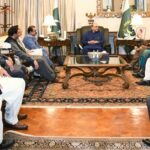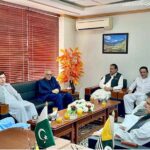UNITED NATIONS, Feb 4 (APP): The head of the United Nations
refugee agency has criticized a temporary U.S. ban on resettlement
of refugees, and urged countries to welcome those fleeing war and persecution, saying they were “not dangerous”.
“These are people that flee from danger, they’re not dangerous themselves,” UN High Commissioner for Refugees Filippo Grandi told
reporters in Beirut following a four-day visit to Syria, where he
witnessed first-hand the massive destruction caused by nearly six
years of conflict.
“We have serious concerns, and these are not new concerns, we’ve
had them for some time, that the refugee issue in the industrialized
world – in Europe, the US, Australia – is very politicized. It
shouldn’t be,” Grandi said, urging rich countries to show generosity
to refugees, rather than regarding them as a threat.
According to the Office of the UN High Commissioner for Refugees (UNHCR), Grandi is the first senior UN official to visit Syria since
Turkey and Russia brokered a ceasefire last month.
Grandi said that the recent decision by the United States to
suspend its refugee resettlement programme would negatively impact
the most vulnerable individuals.
“Resettlement means taking refugees from places like Lebanon,
where they are already refugees, selecting the most vulnerable
and taking them to other places,” he said. “If we weaken that
programme, as has been done in the United States, this is a
very dangerous weakening of the international solidarity for
refugees.”
UNHCR estimates that 20,000 refugees in precarious circumstances
might have been resettled to the US in the 120 days covered by the suspension set out in an Executive Order signed one week ago by
President Donald Trump.
Grandi expressed his hope that the US would resume resettlements following its internal review of the programme.
As for the situation in Syria, he described progress in his
discussions with the Government on humanitarian access in
hard-to-reach areas, and expressed hope that some aid convoys
could reach parts of Homs in the coming days.
On the issue of refugees returning to Syria, the High
Commissioner said that while many were keen to go home,
the political and security situation in the country currently
made it impossible for large numbers to do so.
“People need to return eventually to Syria, and we all
agree that that’s the ideal solution. But we need to be
patient,” Grandi said. “More progress needs to be made
politically, then economically and infrastructure-wise in
order for conditions to be there to have large returns.”
Pakistan's National News Agency






